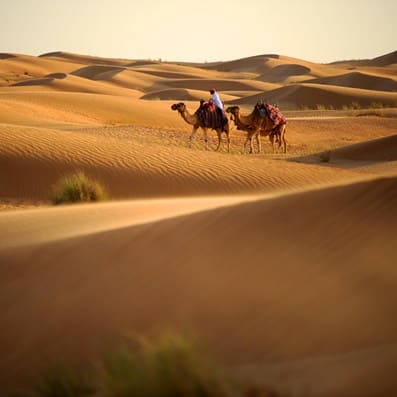History & Heritage
In the footsteps of the Bedouins
Thu 27 March 2025
Dubai's rich history goes back to ancient seafarers. However, the Bedouins are the most intriguing. Who were they and how did they survive?
Dubai's rich history goes back to ancient seafarers. However, the Bedouins are the most intriguing. Who were they and how did they survive?
Bedouin (noun, pronounced Bed-oo-in) | بدوي
Definition: A nomadic Arab of the desert
Bedouins (or Bedawi in Arabic), a semi-nomadic group of desert-dwellers who traversed the sands, are the oldest inhabitants of the Arabian desert. Known for their resourcefulness and hospitality, the Bedouin people survived harsh weather conditions and lived in difficult environments.
These tribes were always on the move and would journey thousands of kilometres across the sand dunes, with just the sun to indicate the east-west directions and the stars to point out the north, while the slant of sand dunes sculpted by prevailing winds offered a further sense of direction. The Bedouins were expert trackers and could distinguish the footsteps of humans from the animals in the sand, identifying whether these belonged to a man, boy, woman or girl.

Desert survival
The arid desert climate and a scarcity of water and natural resources forced the Bedouins to rely on whatever they had access to, in order to survive. Despite this, they led a life of pride and simplicity in the desert, and treated their surroundings with respect. Everything around them was used for daily life, such as ghaf trees for shade and shelter, while wood and desert plants were used to build homes.
Camels were integral to their survival. These utilitarian creatures, known as the 'ships of the desert', were a mode of transport, a source of nourishment and a symbol of wealth. Camel hide was used to make tents, shoes and warm clothing (necessary in cold winter months), while camel hair was woven into rugs. Camel milk, which is packed with nutrients, was used to make yoghurt or clarified butter, and in times of celebration such as weddings, camel meat was served as a delicacy.
Falconry is another tradition steeped in Bedouin history. The Bedouin people discovered that the speed, power and dexterity of a falcon during hunting was far greater than that of a bullet. And they sought to make these birds an indispensable hunting tool. The meticulous process of taming and training turned the wild falcon into a hunter for catching hare, birds and other prey. The bond between a falconer and his bird is cultivated over a long period of time, during which the bird becomes reliant on its owner and accustomed to his voice.

Culture and traditions
The Bedouins are a proud race, and follow a strong code of honour. They are known for their loyalty, first to their immediate families, then to their clans and tribes. In times gone by, each member of the household would contribute to family life. Men were tasked with hunting, trading and protecting the tribe, while women would manage the household, prepare meals and raise children.
They are also known for their hospitality and welcoming nature – a trait seen in modern day Emirati life as well. Guests would be greeted with utmost respect, and were likely to be welcomed with food, dates and and coffee. This tradition carries through today, and it is not uncommon to see hotels and offices offer dates and coffee in reception areas.

Modern-day experiences
While times have greatly changed since the Bedouin tribes roamed these deserts, you can catch a glimpse of their lives at Al Marmoom Bedouin Experience. Set in the heart of Al Marmoom Desert, a 30-minute drive out of the city, you can trace their footsteps through the sand via morning or evening tours. Mount a camel and make your way caravan-style to a traditional majlis, where you'll be entertained with a live falcon show. Your hosts will then take you on a tour through the Bedouin village, where you can see cooking demonstrations, sample fresh Arabic coffee and enjoy age-old Arabian hospitality.






